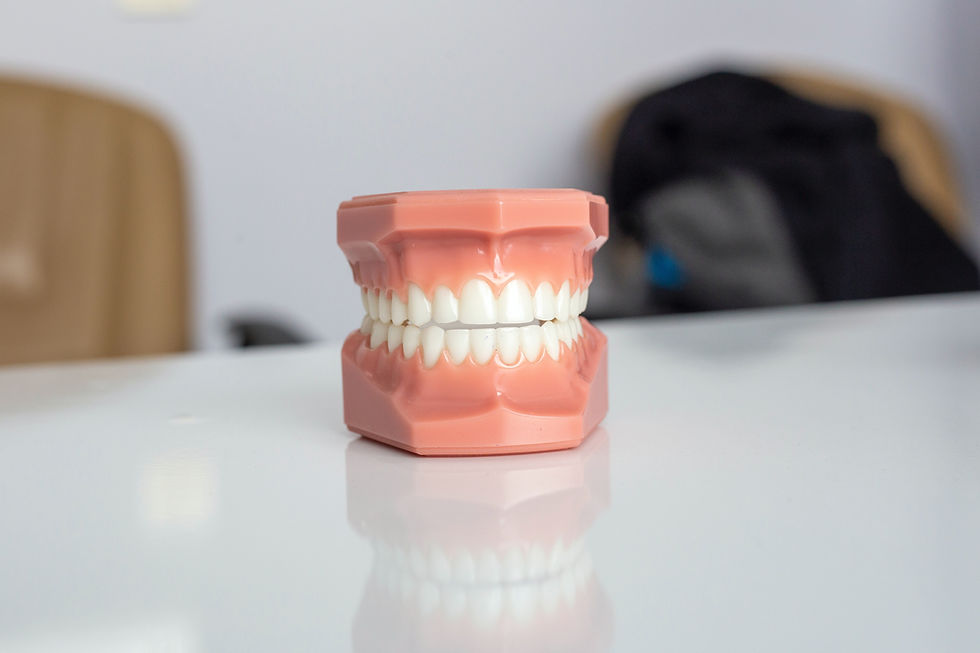Lets talk tooth replacement
- christy446
- Apr 8, 2024
- 3 min read

Losing a tooth, whether due to decay, gum disease, or other dental problems, can significantly impact your oral health and confidence. Fortunately, modern dentistry offers various solutions to replace missing teeth and restore your smile. Here is a step-by-step guide detailing the process from tooth loss to tooth replacement:
Step 1: Addressing Tooth Loss
When you lose a tooth, it’s crucial to seek dental care promptly. Tooth loss can lead to bone loss in the jaw and potentially affect the surrounding teeth. Schedule an appointment with one of our dental experts to evaluate the extent of the issue and discuss replacement options as soon as possible.
Step 2: Assessing Replacement Options
Your dentist will examine your oral health and discuss suitable replacement options. For replacing a single tooth, choices like dental implants, a dental bridge, or partial dentures may be recommended based on your specific needs.
Step 3: Considering Dental Implants
If you opt for dental implants, the process involves surgically placing an implant into the jawbone. This implant serves as an artificial tooth root, providing stability for a crown that looks and functions like a natural tooth. Dental implants help prevent bone loss and maintain the integrity of surrounding teeth. A dental implant is the best long term option to replace a missing tooth as they look and feel more natural and they do not affect the other teeth.
Step 4: Exploring Dental Bridges
Another option to replace a missing tooth is a dental bridge, which consists of a false tooth (pontic) held in place by dental crowns (abutments) on adjacent natural teeth or implants. A fixed bridge restores the gap created by the missing tooth, preventing surrounding teeth from shifting and maintaining proper alignment. Having a bridge may affect adjacent teeth.
Step 5: Understanding Partial Dentures
For replacing multiple missing teeth, especially those not adjacent to each other, partial dentures may be recommended. These removable appliances replace a set of teeth and are supported by the remaining natural teeth or dental implants. Dentures can be difficult to get used to initially however they are less invasive compared to the other choices above.
Step 6: Finalising the Replacement
Once the chosen replacement option is determined, your dentist will customise the prosthetic to match the colour, shape, and size of your natural teeth. This ensures a seamless integration and a natural-looking smile.
Step 7: Maintaining Oral Health
After receiving your replacement tooth or teeth, maintaining excellent oral hygiene is crucial. Regular brushing, flossing, and dental check-ups/hygiene visits are essential to prevent tooth decay, gum disease, and other oral health issues.
Step 8: Long-Term Care
Follow your dentist’s instructions for caring for your replacement teeth. Dental implants, bridges, or dentures require proper maintenance to ensure their longevity and functionality. Attend regular dental visits to monitor the health of your replacement teeth and overall oral health.
Losing a tooth can impact more than just your smile. It can affect your oral health and quality of life. By following these steps and working closely with your dentist, you can effectively replace missing teeth and restore your smile’s functionality and aesthetics, allowing you to enjoy the benefits of a complete set of natural-looking teeth once again.
If you feel as though you require any kind of tooth replacement treatment, get in touch with our team on 01530 510533 and we will schedule a consultation.





Comments